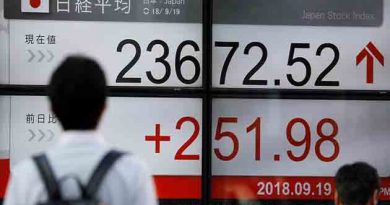Most Asian Markets Trade Lower, With Oil Prices Extending Losses

Greater China markets tracked lower, with the Hang Seng Index slipping 0.11 percent and the Shanghai composite declining 0.71 percent. Meanwhile, Australia’s S&P/ASX 200 pulled back 0.51 percent as declines in energy and materials weighed on the broader index.
South Korea, however, proved to be a bright spot after weekend developments gave rise to optimism that a U.S.-North Korea meeting in June could take place despite being canceled last week. The Kospi rose 0.66 percent amid gains in steelmakers and other manufacturing names: Posco added 3.18 percent and Hyundai Steel jumped 16.87 percent. Large cap technology names traded lower in the early going.
Geopolitical developments over the weekend, including a meeting between the U.S. and North Korean delegations on Sunday, didn’t appear to have a big impact on most markets in the region, with MSCI’s broad index of shares in Asia Pacific excluding Japan little changed in the morning.
The talks on Sunday followed a Saturday meeting between South Korean President Moon Jae-in and North Korean leader Kim Jong Un. That, in turn, came after U.S. President Donald Trump said he canceled a planned meeting with Kim in June last Thursday, although the White House later said it was still making preparations “should the summit take place.”
Oil prices extended declines after coming under pressure last week following news that top producers could ease quotas on existing production cuts. Brent crude futures slid 1.84 percent to trade at $75.01 per barrel and U.S. West Texas Intermediate eased 2.58 percent to trade at $66.13 after settling 4 percent lower in the last session.
“We’ve been calling for oil prices this year to be relatively range-bound around the mid-$60s level and I think that’s a level that OPEC’s relatively comfortable with,” Hannah Anderson, global market strategist at J.P. Morgan Asset Management, told CNBC’s “Squawk Box.”
“What they’re not comfortable with is prices getting high enough that it made sense for those marginal shale producers to come back online, which is really what drove prices down in the first place in 2015,” Anderson said.
“You do not want to give Jeff Bezos a seven-year head start.”
Hear what else Buffett has to say
The mixed trade in Asia followed the mostly lower close stateside on Friday amid a mix of positive corporate earnings releases and geopolitical headlines involving North Korea. The Dow Jones industrial average slipped 0.24 percent and the S&P 500 edged down by 0.24 percent as financial and energy sector stocks continued to contribute to overall losses.
Meanwhile, the euro firmed by almost 0.5 percent after news that Italy’s president had not approved a nominee for the position of economy minister. The common currency traded at $1.1705 at 9:40 a.m. HK/SIN, compared to Friday’s close of $1.1650.
The dollar index, which tracks the greenback against several peers, stood at 93.972. Against the yen, the dollar fetched 109.42.
There aren’t many data releases from the region expected on Monday, with just Hong Kong April trade data expected at 4:30 p.m. HK/SIN. Looking ahead, China is expected to release official Purchasing Managers’ Index data on Thursday.
Meanwhile, markets in the U.S. and U.K. will be closed on Monday for holidays.
Courtasy : CNBC
Photo : Fox Business
[social_warfare buttons=”Facebook,Pinterest,LinkedIn,Twitter,Total”]



